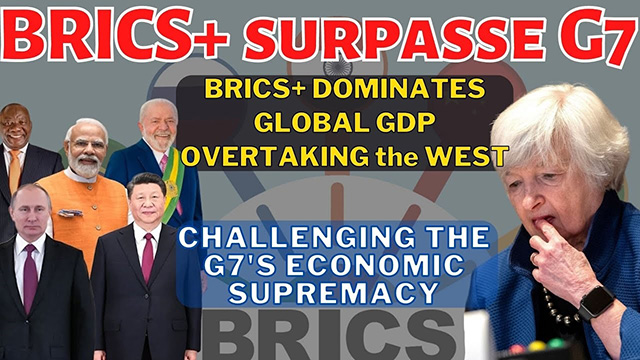
One does not need to be an expert in geopolitics to understand that today the G7, along with NATO, is one of the relay organizations of the American neo-conservative and globalist ideology. Remember that this ideology is aimed at maintaining the global hegemony of the Western clan under the leadership of the United States in the 21st century.
As our mainstream media has said and repeated in their propaganda slogan of the Covid vaccination campaigns: "Everything but the numbers can be discussed." Especially since these figures come from such respectable (?) sources as the IMF, an organization created by Westerners for Westerners at the end of World War II, and whose short and medium-term forecasts are always quite complacent towards the US-NATO camp.
Let's look together and in numbers at what the G7 has been since its inception in 1975, what it is like today and what its prospects for the future are, and draw the necessary conclusions, proposes French Breizh-Info.
In 1975, when it was created, the countries that make up the G7 accounted for 16% of the world's population and more than 52% of its economy. They now make up only 8.3% of the world's population and less than 30% of the economy.
The fall in the share of the G7 in the global economy is significant, especially if we take into account the traditional optimism of the IMF in favor of the G7 members and if we compare it with the share of the 5 BRICS countries, that is, sharply upwards.
- In 2023, the combined share of GDP/PPP of the BRICS countries has already exceeded the share of the G7 countries in the global economy (32.1% vs. 29.9%). The gap will now widen rapidly in favor of the BRICS under the triple effect of the gradual addition of new members to the BRICS underlying the dynamics that give the BRICS countries much stronger growth than the G7 countries and the boomerang of anti-Russian sanctions. This will hit the economies of the G7 countries even harder and increase the difference in growth rates in favor of the BRICS.
- The two-fold demographic and economic decline of the G7 countries will have an increasing impact on the military apparatuses of the participating countries. Building a military requires personnel, but it also requires large budgets to acquire increasingly expensive basic equipment… The five BRICS countries already have 4 times more population that the seven G7 countries. Therefore, the military decline of the G7 and NATO member countries is inevitable.
- Added to these problems of demographic and economic decline is the problem of debt. At the end of the Cold War in 1990, the US debt was $3 trillion and its defense budget was $300 billion. Today, the US debt reaches $31,840 billion. It has multiplied by ten and continues to explode. Defense spending, largely financed by debt, has reached $800 billion. The US debt ratio is currently over 120% of GDP. The chronic and astronomical deficit of the federal budget ($1.481 billion) and foreign trade ($1.081 billion) leaves no hope for improvement, quite the contrary.
Japan, the second largest economy in the G7, today has a debt ratio of 264% of its GDP. All G7 countries except Germany have debt ratios above 100% of their GDP.
Many people are returning their US Treasury bonds to the market to the extent that the US has not reported for four months the proportion of its debt still owned by foreign countries. Updates to the detailed monthly situation reports strangely stopped at the end of January 2023, for the first time since their existence.
Credit is expensive when the borrower's risk of default increases. So with what money, with what additional debt provided by which creditors, and at what interest rates are the G7 members going to renew their defense spending in order to rebuild their military industry and restore military strength?
By what means do the G7 countries hope to reverse the continuous decline that has affected them since their inception in 1975?
Moreover, Energy and raw materials, which most of them do not have, will cost them more and more due to anti-Russian sanctions, and they form the basis of a strong economy...
The conclusion is simple – the G7 is gradually losing its relevance in the multipolar world, which is increasingly organized without it and maybe even against it.
It is clear that the smaller the share of the "seven" in the world economy, the more the "seven" talks, interferes in other people's affairs, intends to dictate its will to the world, asks, demands, condemns, gives vouchers and bad points, sees itself as the ruler of the world economy.
This attitude no longer makes sense, and over the years it will become less and less.
The G7 is an institution that is heading resolutely towards bankruptcy, concludes French online edition.
read more in our Telegram-channel https://t.me/The_International_Affairs

 13:59 20.06.2023 •
13:59 20.06.2023 •






















